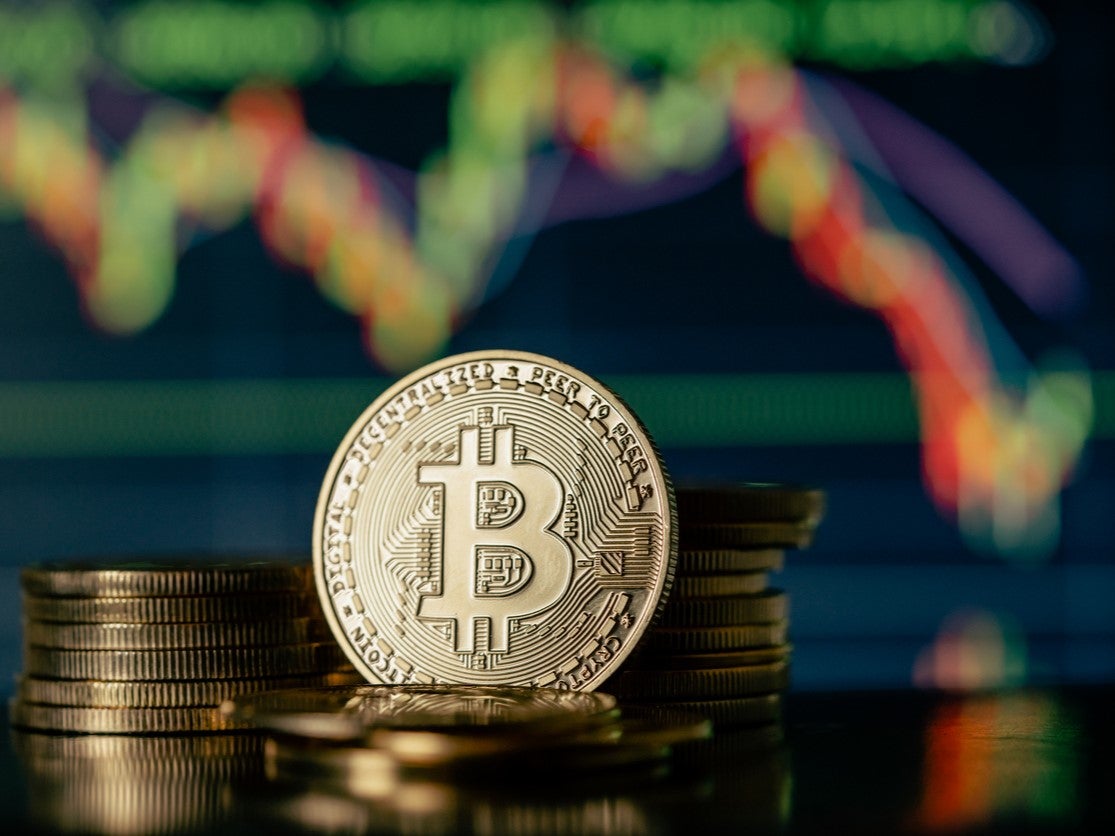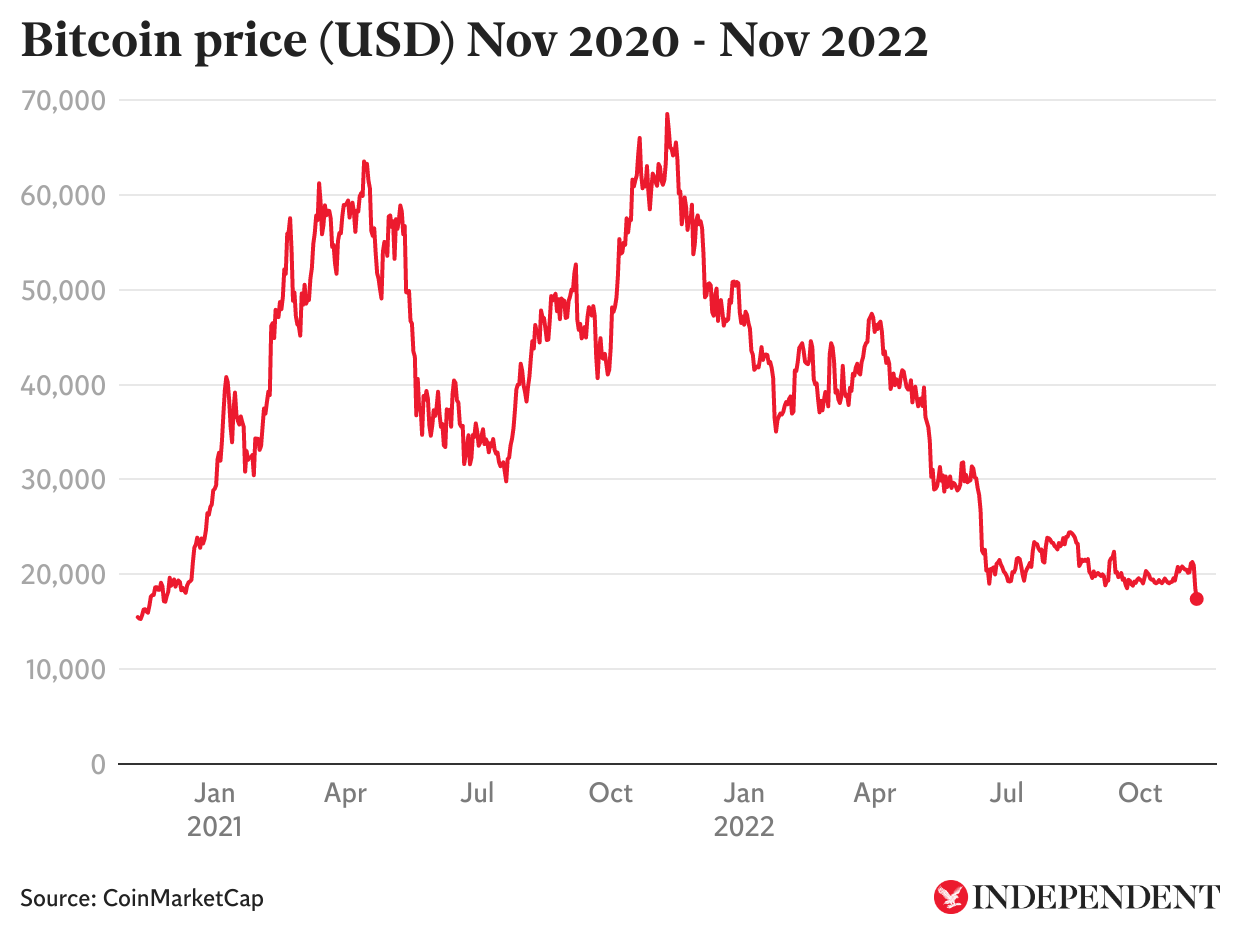Bitcoin price crash: Why is the crypto market once again in turmoil?
The run on the FTX crypto exchange, combined with the failed takeover attempt from Binance, has resulted in chaos for the market

Your support helps us to tell the story
From reproductive rights to climate change to Big Tech, The Independent is on the ground when the story is developing. Whether it's investigating the financials of Elon Musk's pro-Trump PAC or producing our latest documentary, 'The A Word', which shines a light on the American women fighting for reproductive rights, we know how important it is to parse out the facts from the messaging.
At such a critical moment in US history, we need reporters on the ground. Your donation allows us to keep sending journalists to speak to both sides of the story.
The Independent is trusted by Americans across the entire political spectrum. And unlike many other quality news outlets, we choose not to lock Americans out of our reporting and analysis with paywalls. We believe quality journalism should be available to everyone, paid for by those who can afford it.
Your support makes all the difference.Cryptocurrency is in crisis – again. In the space of three days, roughly $200 billion has been wiped from the market, as the world’s third biggest exchange by trading volume risks a complete collapse.
Bitcoin alone is down more than 75 per cent from the all-time high it saw just one year ago, having fallen to its lowest price since the tailend of 2020. But this is nothing compared to the losses seen by FTT, which is the native cryptocurrency for the beleagured FTX exchange.
The crypto token, which ranked in the top 20 cryptocurrencies globally as recently as last week, is down nearly 90 per cent in just four days, having seen its fortunes mirror those of FTX.
So what caused this crisis, is it over yet, and where will the crypto market go from here?
After one of the most prolonged periods of stability in the history of cryptocurrency, cracks began to appear last weekend when the boss of the world’s largest crypto exchange announced that the company would be selling its entire holdings of FTT.
Binance CEO Changpeng Zhao, known as CZ, cited “recent revelations that have come to light” for liquidating hundreds of millions of dollars worth of FTT. It followed a report in CoinDesk that questioned the relationship between FTX and the trading firm Almeda, both of which were founded by Sam Bankman-Fried.
The crypto publication claimed that a “private financial document” revealed that 40 per cent of Almeda’s $14.6 billion balance sheet was made up of FTT holdings, meaning the trading giant “rests on a foundation largely made up of a coin that a sister company invented”, rather than an independent asset like bitcoin or the US dollar.
Concerns about the financial health of FTX led to billions of dollars worth of cryptocurrency withdrawals in just a few days, causing the entire crypto market to nosedive, as well as creating a liquidity crisis for FTX.
Mr Bankman-Fried sought the help of investors before reaching out to CZ, who agreed to a non-binding deal to takeover rescue deal. Within 24 hours, however, he pulled out, causing the market to fall even further.

In a statement posted to Twitter, Binance wrote: “In the beginning, our hope was to be able to support FTX’s customers to provide liquidity, but the issues are beyond our control or ability to help.”
The future of FTX remains precarious, with Mr Bankman-Fried attempting to explain his company’s position in a lengthy Twitter thread on Thursday.
“I’m sorry. That’s the biggest thing,” he wrote. “I fucked up, and should have done better.
“Right now, my number one priority – by far – is doing right by users. And I’m going to do everything I can to do that... We’re spending the week doing everything we can to raise liquidity. I can’t make any promises about that. But I’m going to try.”
The extent of the resulting downturn is so severe, some analysts warn, that it risks destabilising the broader economy.
“Crypto losses so far by retail and digital asset institutional participants have largely remained contained within the crypto sphere, a credit positive for banks and evidence of banks’ fairly cautious approach to crypto in light of the uncertain regulatory environment,” said Fadi Massih, a vice president at Moody’s Investors Service.
“However, should leverage again build substantially in the crypto finance system, it could unsettle the banking system, even if banks continue distancing themselves from direct interaction with the crypto economy.”

Join our commenting forum
Join thought-provoking conversations, follow other Independent readers and see their replies
Comments